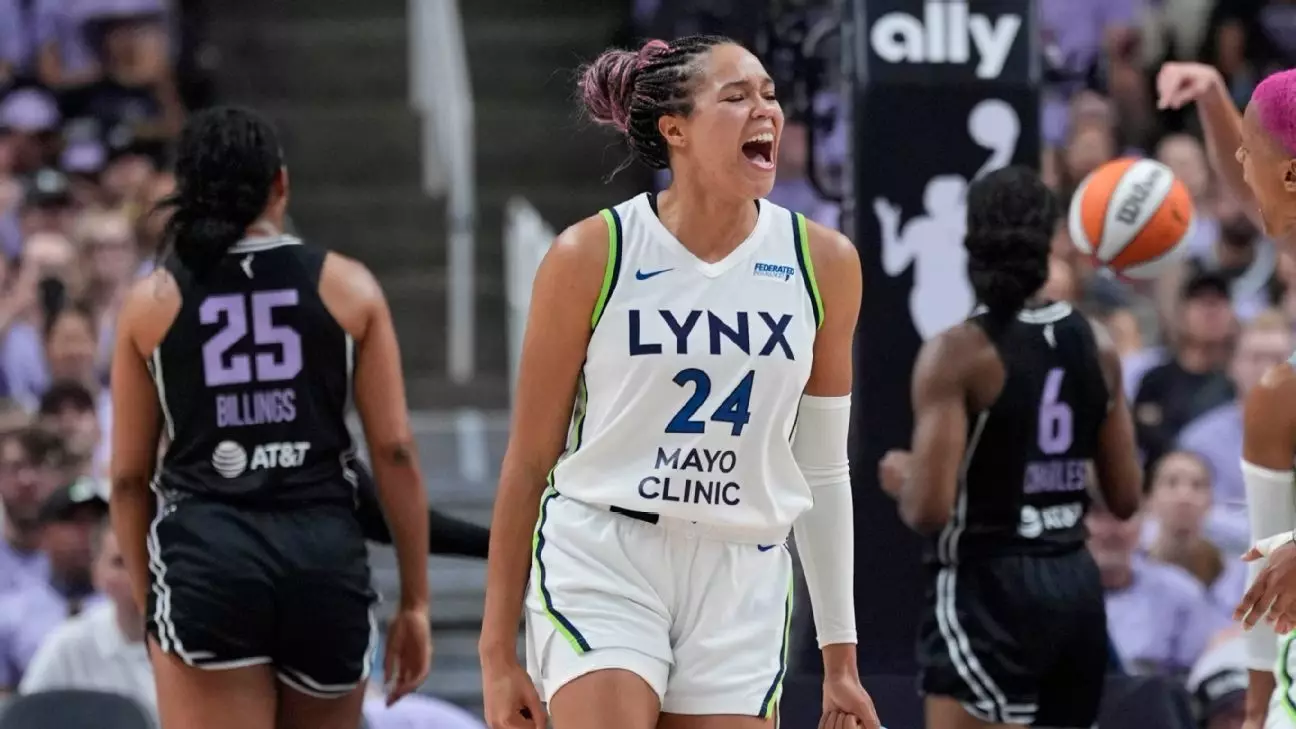In the critically intense arena of professional sports, moments of despair often define teams—not merely the score itself. The recent WNBA playoff clash between the Minnesota Lynx and the Golden State Valkyries exemplifies this truth. Trailing by a staggering 14 points as the fourth quarter commenced, the Lynx faced an almost insurmountable challenge, yet their remarkable comeback underscores a broader message: resilience and grit are invaluable in overcoming systemic setbacks and seemingly impossible odds.
This contest was more than a game; it was a vivid illustration of the capacity for perseverance in a landscape where defeat can seem inevitable. The Lynx, historically vulnerable when trailing in critical moments, refused to succumb to the narrative of inevitable collapse. Instead, they harnessed a collective tenacity that pushed them across the finish line. It is in these moments that true character is forged, and their victory resonates as a powerful statement against complacency and defeatist mentalities often ingrained in competitive environments.
Strategic Slumber and Awakening: The Psychological Battle
Initially, the game appeared to be slipping out of Minnesota’s grasp, with their opponent executing with precision, forcing turnovers, and dictating the tempo. Yet, what distinguishes elite teams from their less resilient counterparts is their ability to reset mentally amidst adversity. Their coach’s admonition—that “there is nothing I can draw for you that will get you an easy bucket”—highlighted a critical philosophical shift: success hinges on a collective mental switch rather than tactical adjustments alone.
This psychological resilience was palpable in the Lynx’s sudden burst of energy and strategic focus in the fourth quarter. They outscored the Valkyries decisively, executing on both ends of the floor with disciplined aggression. Contesting shots, forcing turnovers, and capitalizing on open opportunities, Minnesota demonstrated that mental determination can transcend talent deficiencies or initial tactical failures. It is an implicit lesson in the importance of mindset, particularly in a playoff setting where pressure weighs heavily.
An Unlikely Revival and the Power of the Collective
What transpired in this game transcended simple victory; it was a testament to collective effort triumphing over fleeting individual brilliance. Key players like Napheesa Collier and Kayla McBride stepped into the spotlight, not by accident but through relentless determination. Collier’s clutch baskets in the closing moments exemplified the importance of leadership and composure under pressure, pushing her team toward an improbable victory.
Yet, this isn’t solely about individual heroics. The collective effort—epitomized by a staunch defensive effort contesting 14 of 16 shots—underscored a vital truth: unity and perseverance can dismantle even the most formidable obstacles. Such resilience is vital in a league where the margins for error are razor-thin, and the mental resolve of teams can often determine the victor more than the game plan itself.
Challenging the Systemic Narrative: Resilience Against Adversity
From a broader socio-political standpoint, this game’s narrative mirrors struggles faced in many spheres—whether social, political, or economic—where systemic challenges constantly threaten to dominate. The Lynx’s turnaround is a metaphorical whisper against defeatist complacency, emphasizing that resilience, grit, and unity can challenge entrenched disadvantages.
In the context of societal disparities, marginalized groups often face systemic hurdles that seem insurmountable. The Lynx’s comeback offers inspiration: despite the odds stacked against them, with strategic resilience and collective effort, transformative results are possible. They challenge the narrative of inevitable decline that often pervades underdog stories and serve as a reminder that perseverance can redefine what is possible within a seemingly rigged system.
Implications for the Future: A Call for Genuine Change
This game also prompts a reflection on the importance of structural change over superficial victories. Success on the court is deeply tied to systemic support—adequate resources, inclusive policies, and long-term investments that nurture talent regardless of initial disadvantages. The Lynx’s victory is heartening, but it also spotlights the necessity for leagues and societies to create environments where resilience is cultivated and supported rather than left as an individual burden.
The playoff drama reveals that while individual and team resilience can circumvent immediate obstacles, sustainable progress depends on addressing foundational inequalities and systemic flaws. As we celebrate victories like this one, the real challenge remains: building a system that does not require miraculous comebacks in the first place, but one that fosters fairness and opportunity from the outset.
This thrilling game serves as more than a sports story; it is a catalyst for rethinking how resilience, unity, and systemic support intertwine. It reminds us that even in the face of overwhelming odds, the human spirit—and a fairer system—can rewrite the script.

